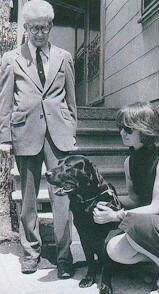Give a hearty handshake to the men and women who keep your car running and on the road (and give you estimates that are less than meaningless.)
and remember to compliment them on the luxurious locks.
June 12, 1950 -
Elia Kazan's film-noir thriller, Panic In The Streets, opened on this date.
Though Elia Kazan liked to claim that much of Panic in the Streets was improvised, there was a script, adapted by Richard Murphy and Daniel Fuchs from a story by Edward Anhalt and Edna Anhalt.
June 12, 1963 -
The four-hour film spectacle, Cleopatra, starring Elizabeth Taylor and Richard Burton, premiered in New York City, on this date.
When the film finally broke even in 1973, 20th Century-Fox "closed the books" on Cleopatra, keeping all future profits from this film secret to avoid paying those who might have been promised a percentage of the net profits.
June 12, 1968 -
Roman Polanksi horror classic Rosemary's Baby, premiered on this date.
It was on the set of this film that Mia Farrow received divorce papers from then-husband Frank Sinatra.
June 12, 1972 -
The film Deep Throat was released in NYC on this date. You look for the clips
June 12, 1981 -
A bizarre coincidence but Mel Brooks' History of the World Part 1 and Lucas/ Spielberg's Raiders Of The Lost Ark both premiered on this date.
Gregory Hines replaced Richard Pryor at the last minute. Just like in Mel Brooks' earlier Blazing Saddles, Pryor was originally cast but had to pull out of the picture. Pryor's part eventually was taken by Hines in his screen debut. Just before filming was to begin, Pryor had his infamous drug-related accident, catching fire and getting severely burnt.
Indiana Jones never loses his hat as an homage to the classic serials of the 1940s. In those serials, the heroes' hats stayed on heads through virtually any assault. This was done for continuity reasons, but also because it was considered poor taste for a gentleman to be without his hat in certain situations - even on the silver screen.
Aren't you glad that you know all of this.
Today in History -
In early 1381 England imposed a new tax, which was called the "Pole Tax" because everyone got the shaft.
June 12, 1839 -
Alexander Cartwright, and not, Abner Doubleday, should be credited with the invention of baseball.
On the one hundredth anniversary of the apocryphal story, the National Baseball Hall of Fame opened in Cooperstown, New York (in an effort to bring tourists to town.)
The first five inductees were Walter Johnson, Honus Wagner, Ty Cobb, Christy Mathewson and Babe Ruth.
The Swiss Army Knife was patented on June 12, 1897. It was the fruit of centuries of Swiss research, development, and testing. Its release was heralded as the dawn of a golden age of Swiss technology.
Switzerland may not have won a war since, but they've never been caught without a corkscrew.
June 12, 1942 -
A young Dutch girl receives the crappy gift of a diary as a birthday present on this date.
She natters on for a little more than two years of small, inconsequential things young girls usually do in their diaries and then she abruptly stops writing. Today, her diary has been published in over 30 languages.
So parents, chose wisely when giving your children birthday gifts.
June 12, 1963 -
Civil rights leader and NAACP official, Medgar Evers was fatally shot in front of his home in Jackson, Mississippi by the KKK.
An informant in the KKK, Delmar Dennis, later served as a key prosecution witness in convicting Byron De La Beckwith for the slaying. Beckwith was convicted of murdering Evers and sentenced to life in prison; he died in 2001 at age 80.
June 12, 1978 -
David Berkowitz was sentenced to 365 consecutive years in prison without the possibility of parole on this date.
Berkowitz killed six New Yorkers between 1976 and 1977, known collectively as the Son of Sam murders.
Harvey, Sam Carr's dog, was not charged with any crime.
June 12, 1982 -
The largest anti-nuclear protest, with some one million anti-nuclear demonstrators rallied in Central Park, NYC on this date.
At the time, it was also the largest political demonstration, of any kind, in American history.
June 12, 1987 -
U.S. President Ronald Reagan publicly challenges Mikhail Gorbachev to tear down the Berlin Wall at Brandenburg Gate.
Although there is some disagreement over how much influence, if any, Reagan's words had on the destruction of the wall, the speech is remembered as an important moment in Cold War history.
And so it goes.



No comments:
Post a Comment